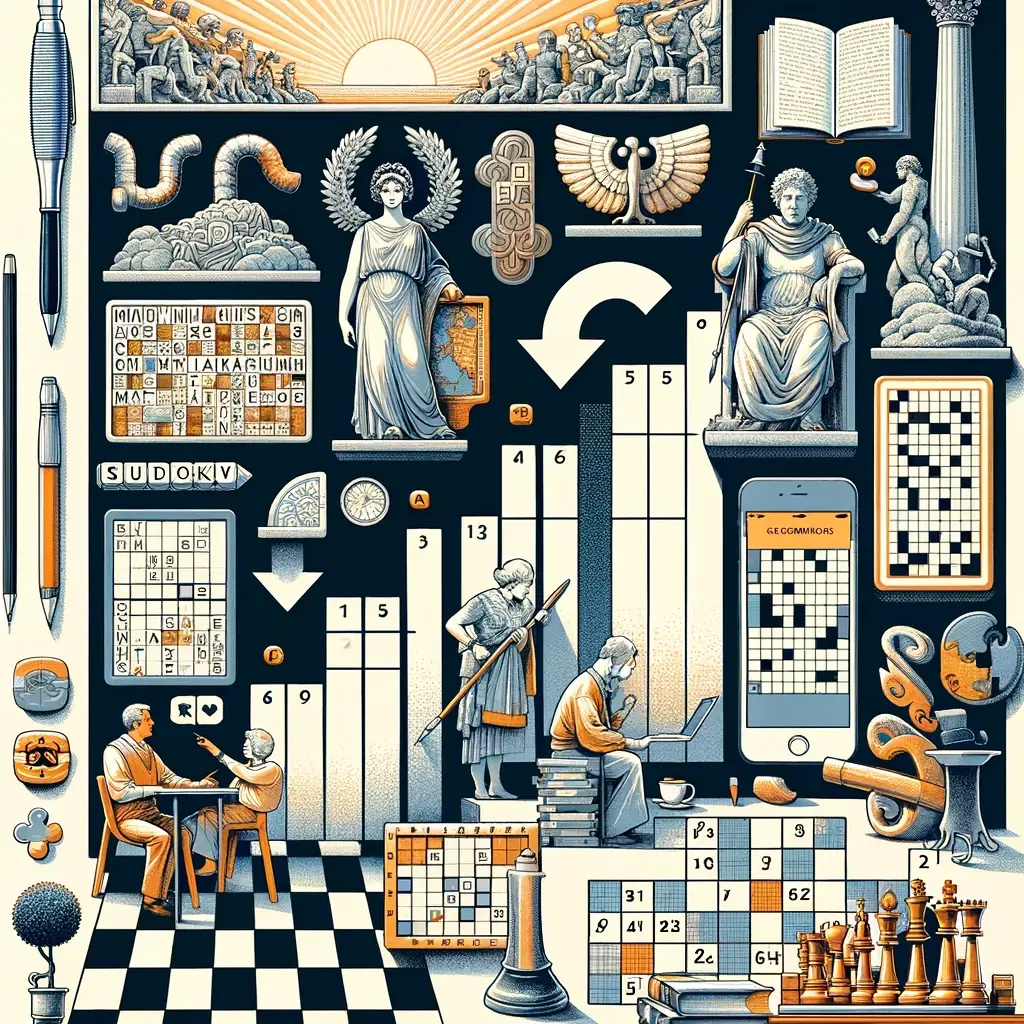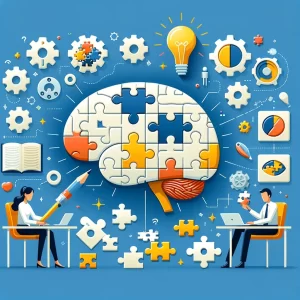Brain Games Through the Ages: A Historical Perspective
Introduction to Brain Games Through the Ages
Definition and Overview of Brain Games
Brain games are activities designed to stimulate the brain and enhance cognitive functions such as memory, attention, and problem-solving skills. These games come in various forms, including puzzles, riddles, and strategic games, all aimed at challenging the mind in a fun and engaging way.
Brief History of Brain Games and Their Evolution
The concept of brain games dates back centuries, with early civilizations recognizing the importance of mental stimulation for overall well-being. Over time, brain games have evolved from simple puzzles carved on clay tablets to sophisticated digital applications accessible on smartphones and computers.
Ancient Origins of Brain Games
In ancient civilizations like Egypt, Greece, and Rome, brain games were prevalent among the elite classes as a way to test intelligence and strategic thinking. Examples include the Egyptian game of Senet, the Greek game of Petteia, and the Roman game of Ludus Latrunculorum.
Brain Games in the Middle Ages and Renaissance
During the Middle Ages and Renaissance periods, brain games gained popularity in Europe as scholars and intellectuals recognized the benefits of mental challenges. Notable figures like Leonardo da Vinci and Galileo Galilei contributed to the development of brain-teasing puzzles and mathematical games.
Brain Games in the Modern Era
In the 19th and 20th centuries, advancements in psychology and cognitive science further fueled the popularity of brain games. Researchers began studying the impact of these games on brain function and mental acuity, leading to the creation of structured cognitive training programs. Stay tuned for the next chapter, where we explore the contemporary landscape of brain games and their profound impact on cognitive function and mental well-being.
Ancient Origins of Brain Games
Early Forms of Brain Games in Ancient Civilizations
In ancient civilizations, brain games were not just a pastime but held significant cultural and intellectual value. These early forms of brain games served as a way to stimulate the mind, test strategic thinking, and enhance problem-solving skills.
Egyptian Brain Games
The ancient Egyptians engaged in various brain games, with one of the most popular being Senet. Senet was a game of strategy and luck played on a board of thirty squares. It required players to think ahead and make tactical moves to outsmart their opponents.
Greek Brain Games
The Greeks were known for their love of intellectual pursuits, and brain games were no exception. Petteia, a strategic board game similar to modern-day chess, was a favorite among Greek scholars and philosophers. It challenged players to anticipate their opponent’s moves and plan several steps ahead.
Roman Brain Games
In ancient Rome, Ludus Latrunculorum, also known as “the Game of Mercenaries,” was a popular brain game that focused on military strategy and tactics. Players had to strategize their moves to capture their opponent’s pieces while protecting their own, honing their decision-making skills in the process. These examples from Egyptian, Greek, and Roman civilizations highlight the early origins of brain games and their role in stimulating cognitive abilities and promoting strategic thinking among ancient societies.
Brain Games in the Middle Ages and Renaissance
Emergence of Brain Games in Medieval Europe
During the Middle Ages, intellectual pursuits began to flourish in Europe, leading to the emergence of brain games that challenged the minds of scholars and laypeople alike. These games served not only as entertainment but also as tools for sharpening cognitive abilities and strategic thinking.
Chess: The Game of Kings
One of the most iconic brain games to emerge during this period was chess. Originating in India and making its way to Europe, chess captured the imagination of medieval society. With its intricate rules and emphasis on foresight and planning, chess became a popular pastime among nobles and commoners alike.
Riddles and Enigmas
In addition to structured games like chess, riddles and enigmas gained popularity as brain-teasing challenges. Riddles required wit and lateral thinking to solve, while enigmas tested one’s ability to decipher hidden meanings and messages.
Renaissance Scholars and Their Contributions to Brain Games
The Renaissance period saw a resurgence of interest in intellectual pursuits, leading to significant advancements in brain games. Scholars such as Leonardo da Vinci and Galileo Galilei not only excelled in their respective fields but also engaged in brain games to keep their minds sharp.
Mathematical Puzzles
Renaissance mathematicians developed intricate puzzles and mathematical challenges to stimulate logical reasoning and problem-solving skills. These puzzles ranged from geometric conundrums to algebraic equations, providing a mental workout for enthusiasts.
Memory Games and Mnemonics
As the importance of memory in learning and scholarship became evident, Renaissance scholars devised memory games and mnemonic techniques to enhance cognitive retention. These games involved memorizing sequences, patterns, and complex information, fostering improved recall and cognitive agility.
Overall, the Middle Ages and Renaissance marked a pivotal period in the evolution of brain games, with intellectual challenges becoming integral to the pursuit of knowledge and critical thinking.
Brain Games in the Modern Era
Popularization of Brain Games
In the 19th and 20th centuries, brain games saw a significant surge in popularity among people from various walks of life. These intellectual challenges became not only a source of entertainment but also a means to exercise cognitive skills and mental acuity.
Chess and Mathematical Puzzles
Games like chess gained widespread appeal, attracting enthusiasts worldwide. Chess, with its intricate strategies and complex gameplay, became a symbol of intellectual prowess and strategic thinking. Mathematical puzzles also became prevalent, stimulating logical reasoning and problem-solving abilities.
Memory Games and Mnemonic Techniques
Memory games and mnemonic techniques gained traction as tools to enhance cognitive functions. These games focused on improving memory retention and recall, offering individuals a way to sharpen their mental faculties through practice and repetition.
Influence of Psychology and Cognitive Science
The field of psychology and cognitive science played a pivotal role in shaping the development of brain games during this era. Researchers and scholars delved into understanding the underlying mechanisms of cognitive processes, leading to the creation of more sophisticated and targeted brain training exercises.
Research-backed Approaches
Psychological studies provided insights into how different types of challenges could impact cognitive functions such as memory, attention, and problem-solving. This scientific approach influenced the design of brain games, ensuring that they were not just entertaining but also effective in enhancing mental abilities.
Integration of Technology
Advancements in technology further propelled the evolution of brain games, paving the way for interactive digital platforms that offered a diverse range of cognitive exercises. These digital brain games made mental workouts accessible to a broader audience, democratizing the benefits of cognitive training.
Contemporary Brain Games and Their Impact
Rise of Digital Brain Games
In the contemporary era, the landscape of brain games has been revolutionized by the rise of digital platforms. These interactive games offer a diverse range of cognitive exercises that cater to various mental faculties. With the advent of technology, individuals now have access to a plethora of brain-stimulating activities at their fingertips.
Digital brain games have transcended traditional boundaries, making it convenient for people of all ages to engage in cognitive challenges anytime, anywhere. The gamification of mental workouts has not only made these activities more engaging but also more accessible to a wider audience.
Benefits for Cognitive Function and Mental Well-being
The impact of contemporary brain games on cognitive function and mental well-being cannot be overstated. These games have been scientifically proven to enhance various cognitive abilities, including memory, problem-solving skills, attention span, and processing speed.
Regular engagement with brain games has shown to have positive effects on overall mental acuity and agility. By challenging the brain with different tasks and puzzles, individuals can maintain and even improve their cognitive capabilities over time.
The Future of Brain Games
Emerging Trends in Brain Games
As we step into the digital age, the landscape of brain games is rapidly evolving. New trends are emerging that cater to a diverse range of cognitive exercises aimed at enhancing memory, problem-solving skills, attention span, and processing speed. These games are designed to be engaging, interactive, and accessible on various platforms, making mental workouts convenient for users from all walks of life.
1. Virtual Reality Integration
One of the key trends in brain games is the integration of virtual reality (VR) technology. VR offers immersive experiences that challenge the mind in ways traditional games cannot. By simulating real-life scenarios and complex puzzles, VR brain games provide a unique opportunity for players to enhance their cognitive abilities while enjoying a more interactive and engaging gameplay.
2. Personalized Learning Paths
Another exciting trend is the development of brain games that offer personalized learning paths based on individual strengths and weaknesses. By utilizing algorithms and data analytics, these games can tailor challenges to each player’s specific cognitive needs, ensuring a more effective and enjoyable learning experience.
Potential Applications and Implications
The potential applications of brain games extend beyond personal cognitive enhancement. These games have the potential to be utilized in various fields, including education, healthcare, and professional training.
1. Educational Settings
In educational settings, brain games can be used to supplement traditional learning methods, helping students improve their critical thinking, problem-solving, and memory retention skills. By incorporating gamified learning approaches, educators can make learning more engaging and effective for students of all ages.
2. Cognitive Rehabilitation
In healthcare, brain games show promise in cognitive rehabilitation programs for individuals recovering from brain injuries or cognitive impairments. These games can aid in restoring cognitive functions, improving memory, and enhancing overall brain health through targeted exercises and challenges.


